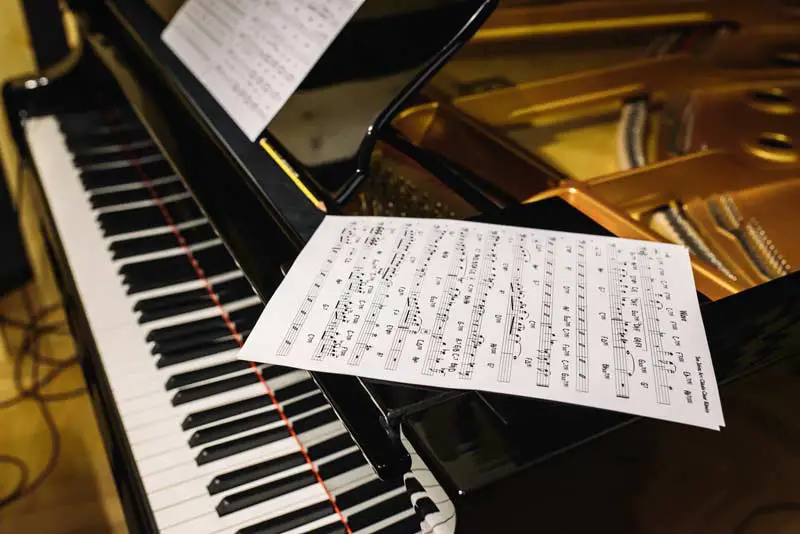Many homes across the country have a piano inside them. The cost of replacing a piano if it is damaged can be substantial. One question that arises is if you need to have separate insurance for your piano or simply count on your homeowner’s insurance policy to cover it.
While a homeowner’s policy does cover a piano in case of damage, there are certain things to make sure are clarified in your policy. Most homeowner’s policies protect up to a certain amount of value on all property in the household. If a piano’s value is high, you need to make sure it is fully covered under the general policy included with your other property. If not, you may have to choose between what you want to be replaced in your home.
There are several other factors to discuss in regard to making sure your piano is fully covered within your insurance policy. We will take a look at what you should consider when purchasing a piano for your home.
How Do I Know My Piano Is Properly Insured?
Piano purchases are not something that most people take lightly. They are considerable investments that stay with the family for years and can even be heirlooms. Making sure they are covered by insurance is essential in case they are ever damaged in a disaster. Below are a few things to think about when purchasing a piano and your homeowner’s insurance.
- The Value of Your Piano
- Speak to Your Insurance Company
- Place Your Piano on a Policy Rider
- Insure Your Piano for Replacement Value
The Value of Your Piano
When you purchase a new piano, it is easy to know its value since you have a receipt from where you bought it. In cases of inheriting a piano or purchasing a used one, you may not know the true value.
The importance of knowing the actual value of your piano is to see the replacement cost if it is damaged during a fire, flood, or any other disaster. A general homeowner’s policy usually only covers a certain amount for personal property loss.
If you inherit a piano from a rich aunt, it may be worth thousands of dollars. Let’s say, for example, you have personal property loss coverage for $50,000 on all of the valuables you own, and your house burns, you will only get that amount. If your piano places your belongings’ value at $60,000, you will lose that money in return.
Speak to Your Insurance Company
Your insurance company is there for more than taking your money and calling when something bad happens. If you purchase or inherit a piano, contact your insurance agent to gain their advice on insurance for the piano or any other large home purchases for that matter.
Place Your Piano on a Policy Rider
The advice you may receive from your agent is to place your piano on a policy rider. This is an amendment to your policy that can list the piano separately from other personal property and ensure it is insured for the proper value.
Insure Your Piano for Replacement Value
There are two types of insurance coverage when receiving compensation from damage after a claim. One is to be covered for the piano’s market value, and the other is for the replacement cost. If your piano has depreciated under a market value option, you will not receive enough compensation to replace it. If, however, you have it insured for the replacement value, you will be able to receive a new piano.
 How Do I Find the Value Of My Piano?
How Do I Find the Value Of My Piano?
We have discussed the importance of knowing your piano’s worth, but now let’s talk about how to truly find its value. Here are the different ways to determine the value of your piano.
- Receipt: Again, for new pianos, you should have a receipt form when you purchased it. If, however, you discarded the receipt in the first few months, you must obtain the value another way. If purchased on credit care, you can look back on your statements and find the actual charge. Another way is to look online or call the store you purchased the piano and retrieve the price this way.
- Research: For a used piano purchase, you can use the internet to find the same model pianos and compare the prices they are for sale for.
- Appraisal: For heirloom antique pianos, it is always a good idea to have them appraised by a professional. Antiques, in particular, have characteristics that can greatly change their value. For example, one piano similar to another may have a special story behind it that makes the value much higher. A professional appraisal will be able to give you the best clarity on values for your antique pianos.
All of the above are ways to find the true value of your piano. If damage ever happens to your home, it is important to not only know the value of your piano but to also have evidence.
Suppose you do not have evidence; an insurance adjuster will research the value for themselves. When this happens, the adjuster will always take the lowest price found. If you have an antique that is more expensive due to a special characteristic, the adjuster will not have that consideration without evidence.
How Do I Keep My Piano from Getting Damaged?
Avoiding an insurance claim is the best bet for you and your piano. To do this, there are a few things you can do to reduce the risk of damage.
- Climate Controlled Environment: Pianos in homes are usually kept in a climate-controlled environment. What happens when you are moving or having remodeling and have to place your piano in storage? Be careful of storage units that cost less by not offering climate control. Your piano is sensitive to the environment. Issues such as too much humidity could damage a piano in a few short weeks.
- Kept In an Adult Area: We know children love to run and play and need a place to do it. Where that is should never be in the same room as your piano. Your piano should be kept in a formal area where kids do not run free and possibly cause damage to it.
- Forbid Liquids at Your Piano: Liquids such as wine should not be near your piano. A spill can easily cause damage.
- Away from Windows: If you live in an area prone to hurricanes or other serious storms, do not keep your piano near windows. If a window is broken out during a storm, your piano could be damaged by the wind and rain.
Conclusion
Purchasing a piano is an investment. Hopefully, you and your family will own and enjoy it for years to come. Ensuring it is properly covered on insurance is important as general personal property coverage is only for a specific amount. Knowing the value of your piano and having your insurance agent cover it for the right amount of replacement value is essential.
To keep your piano safe and from having to file a claim, there are ways to mitigate the risk of any damage occurring. Good luck with your piano purchase, and enjoy the music you make.
Click here for related articles on taking care of your piano.
Looking for supplies? We got you covered.


